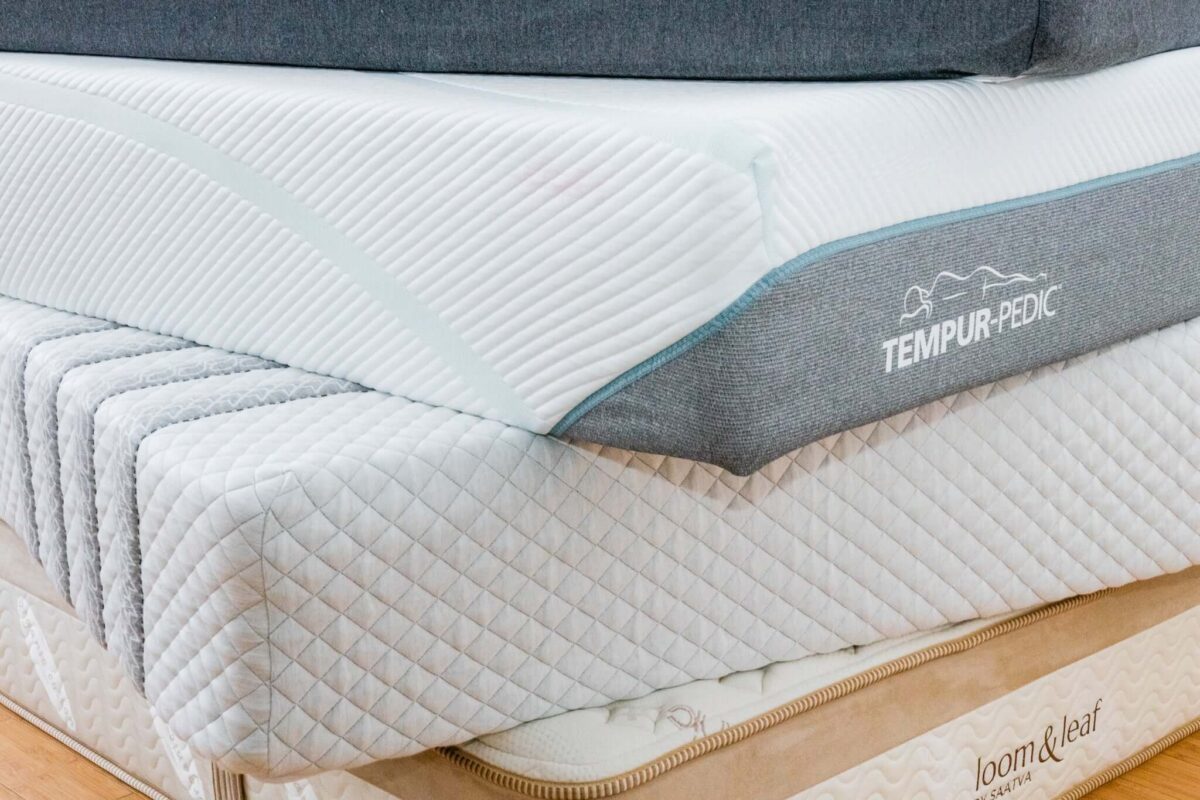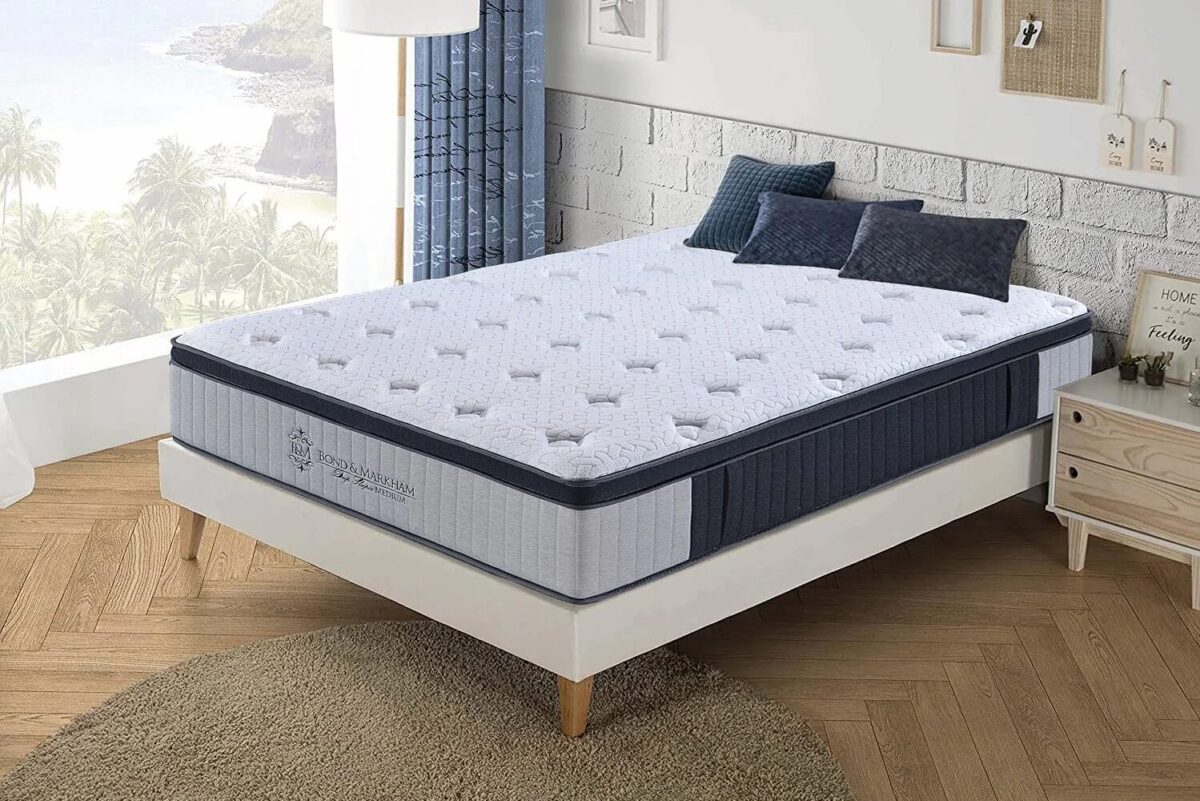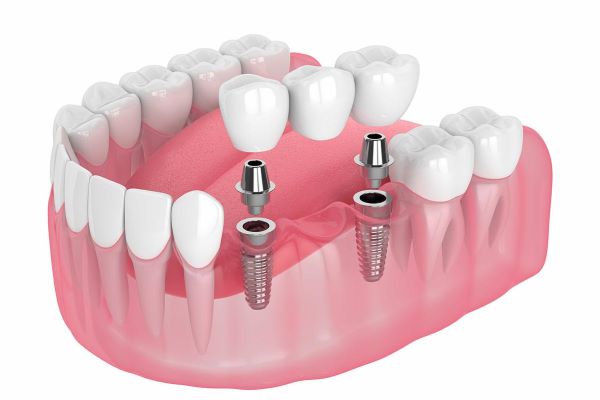The many benefits of quality sleep are undisputed. Better sleep can give you a new lease on life and help you achieve everything you desire. To sleep well, you need to invest in the most comfortable mattress that delivers both support and coziness. But how long does a mattress last, and when is the right time to upgrade?
We’ll help you answer these questions and so much more in this comprehensive guide.
1. What Is The Lifespan Of A Mattress?
While many factors contribute to how long your mattress will last, most quality mattresses will require an upgrade every 6 – 8 years. How long a mattress lasts can be influenced by the frequency of usage, the weight of the person using it, how well it’s cared for, as well as the material used to make it.
Traditional beds such as spring mattresses, latex mattresses, and water beds tend to have a shorter mattress lifespan than more recent innovations such as memory foam mattresses and hybrids. However, when cared for correctly, the best memory foam mattress can last up to 15 years.
One thing to keep in mind is that a deteriorating mattress isn’t the only reason you might want to upgrade. Your comfort and support needs are likely to shift as you age, experience pain, or face other sleeping difficulties.
Most people choose to buy a new mattress before it reaches the dire end of its life expectancy because sleeping on a lumpy and uncomfortable bed can do more harm than good for your sleep health.
2. Side-Effects Of Sleeping On An Old Bed
Sleep is a vital function that impacts all facets of human functioning. One of the critical roles of sleep is to recuperate the body and repair damaged cells. An old bed can make this recuperation process difficult because an unsupportive bed will place additional strain on pressure points, muscles, and joints. Not to mention, it can negatively impact sleep quality.
The result? You can actually wake up in more discomfort and extend the effects of body aches and pains. It may come as a surprise to you, but putting your mattress upgrade on hold can also trigger allergy symptoms and significantly worsen the air quality of your bedroom.
Mattresses are notorious for trapping dust, dust mites, dead skin, sweat, and other allergens. The danger of keeping a mattress for too long is that you can end up breathing these particles into your airways each night. So buying a new mattress before the end of its lifespan will help your body, as well as protect the air you breathe.
3. 6 Signs It’s Time To Replace Your Mattress
There isn’t a precise expiration date on your mattress, but there are ways to identify the right time to upgrade. Signs of wear and tear on your mattress will range from how your mattress looks to how quickly you fall asleep, and importantly, how your body feels when you wake up each morning. Here are six key signs that you need a new mattress:
1) Waking up tired
One of the most prominent telltale signs that you are ready for a new bed is that you wake up each morning feeling like you haven’t slept at all. If you are sleeping between 7 – 8 hours each night, you should wake up feeling rested enough to start your day full of energy.
An uncomfortable mattress may cause you to wake up multiple times throughout the night. This is because you break your sleep cycle and affect your circadian rhythm, which can lead to annoying morning grogginess. When you sleep, you transition through 5 stages of sleep. Each stage plays a crucial role in helping you repair and rejuvenate.
Any disturbance to your sleep cycle, such as waking up constantly due to discomfort, will contribute to morning fatigue.
2) The mattress is sagging
Nothing is more unsightly than a sagging mattress. Over time, most mattresses will sag due to the intensity of usage. While some people will act at the first sign of mattress sagging, others will delay a mattress upgrade, thinking that the wear and tear is normal.
Foams used in mattresses soften after years of use. This creates sagging, and as a result, you will feel like you are sinking into your mattress. In most cases, when you sleep on a sagging mattress, you will find it challenging to get up or change your sleeping position throughout the night.
A sagging mattress will not benefit your sleep health and should be disposed of and replaced with a comfortable and supportive mattress.
3) You feel more body pain
An aging mattress can place significant strain on the body and leave you waking up with aches and pains in new places. Waking up with a sore body is a clear sign that the life of your mattress is reaching an endpoint.
You will spend over a third of your life in bed, so it’s essential to invest in a bed that will guarantee comfort and support. Unfortunately, a mattress with too much wear and tear won’t deliver the sleep benefits you need to wake up refreshed and rejuvenated.
4) You experience night sweats
Sleeping hot can be frustrating, especially if you experience night sweats. One of the first features that start dwindling as your mattress ages is airflow and breathability.
When layers compress too much, it can be close to impossible for the mattress to regulate temperature. As a result, hot air can get trapped between the layers causing you to overheat and disrupt your sleep cycle. Those who naturally sleep hot can also experience extended periods of night sweats which leads to fatigue.
5) The mattress moves or shakes
Does your mattress sink or shuffle with even the slightest movement? It’s definitely time for a mattress upgrade. The reason older mattresses shake and slide is that they cannot isolate motion.
When sleeping with a partner, an old mattress will cause the opposite side of the bed to bounce when your partner moves or gets out of bed. This can be highly disturbing throughout the night. If you upgrade to the best mattress, you can expect it to isolate motion with ease and remain entirely still even if there is movement around you.
6) You have frequent allergies
Over 10 million dust particles and other allergens can get trapped between the layers over the lifespan of your mattress. In some cases, this build-up can even cause your mattress to triple in weight! This is bad news for allergy sufferers who are sensitive to air pollutants.
Laying on a mattress full of dust can aggravate allergies leading to breathing difficulty and skin irritation. If you feel your allergies are flaring up, it may be best to consider a mattress upgrade sooner rather than later.
4. How To Select The Best Mattress
By now, you are well equipped to identify the signs that indicate it’s the best time to buy a new mattress. But with so many options, how do you know which mattress is right for you and which one guarantees longevity? It’s pretty simple when you know the type of mattresses available and the benefits that they deliver.
- Memory foam mattress: Memory foam mattresses are one of the most durable in the market. The viscoelastic foam is highly adaptive and contours to the body, making it one of the best mattress types for contouring. Unlike other foam mattresses, memory foam isolates motion really well, so you can sleep undisturbed all night.
- Hybrid mattress: As one of the best new mattress types in the market, hybrid mattresses take all the fantastic features of a memory foam mattress and combine them with the benefits of coils. This combination creates better stability and a slight bounce for extra pressure point support.
- Innerspring mattresses: While some people prefer traditional spring mattresses, they do not have a long lifespan, so it may not be the best choice if you are seeking durability. Springs can’t withstand as much weight, and after a while, broken or damaged springs can make the mattress feel bumpy.
- Latex mattress: Latex mattresses are considered durable and are a good option for people who may enjoy a much firmer feel. Unlike memory foam which confirms, latex isn’t as adaptive.
To make your mattress last longer, ensure you buy one that has a washable mattress cover. Also, keep an eye out for a hypoallergenic stamp. Hypoallergenic mattresses repel dust and prevent the build-up of dust mites and other allergens.
5. FAQ’s
Here are some answers about mattresses.
1) How long does a mattress last?
Depending on how much you use it and how well you care for it, most mattresses will last between 6 – 8 years. Some can last longer, especially if you’re a solo sleeper or have a light body weight. To protect your investment, always upgrade to a mattress with a lifetime warranty so that you know it will last the test of time. In addition, you can prolong the life of your mattress by purchasing one that has a stain-resistant and washable cover. Also, ensure you read mattress reviews to ensure customers back the brand’s promise of quality.
2) What mattress types last the longest?
Two of the best mattress types for durability are memory foam mattresses and hybrid mattresses. Both of these mattress types are designed with longevity in mind. Premium memory foam is highly durable and innovative to support 350 lbs on each side of the bed. Furthermore, memory foam is a conforming material that NASA designed to adapt to the body. The innovative formulation of memory foam is why it is considered one of the most durable materials.
3) When to replace a mattress?
It’s a clear sign that you need to replace your mattress if your mattress is sagging, causing aches and pains, or if you are waking up tired and groggy, even after 8 hours of sleep. Another sign that you need to upgrade your mattress is if your sleep needs have changed and your old bed doesn’t provide adequate support.
4) Can a mattress last 20 years?
It depends on the usage, but it isn’t recommended to sleep on an uncomfortable or unsupportive mattress. Most mattresses won’t last 20 years if used every night as they will experience inevitable wear and tear.
5) How do I know if a mattress is worn out?
You will know your mattress is worn out if it shows obvious signs of physical deterioration. For example, you may notice lumps, your mattress may be very heavy, the foam might be sagging in places, it could have a bad smell, or it may even feel hot. In addition, your mattress needs to support your sleep, and if you think it’s not helping you sleep better, it’s a clear sign that it may be time for a mattress upgrade.
6. Conclusion
Achieving better sleep is only possible when you have a mattress that supports you in all the right ways. By now, you can answer the question ‘How long does a mattress last.’ Once your mattress reaches 6 – 8 years in its lifespan, and it’s not supporting your sleep health, you should start looking for a new mattress.
A new mattress is an essential investment in your health. The best mattress will help alleviate pain and allow you to feel restored each time you wake up in the morning. You have an endless choice of a new mattress to choose from no matter what your budget is.
The best thing? You can buy an award-winning mattress like Ueesleepy from the comfort of your own home.









